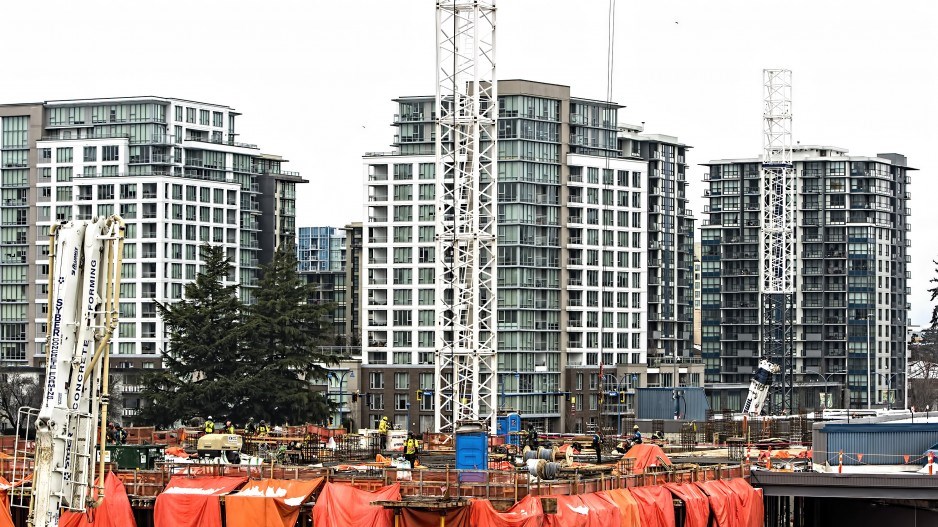Amid concerns and social media chatter that a Canadian developer may soon find themselves in financial straits, four Metro Vancouver development companies say they are doing just fine.
The development industry is navigating a higher-interest-rate environment, but one that is unique compared to 2008-09, due to the compounding impact of rapidly rising rates colliding with high construction costs, permitting delays and increasing government fees, taxes and levies.
These factors combined result in a slowdown of activity, which has caused developers to think strategically about the projects in which they choose to invest money and time, according to those who spoke to BIV.
Despite present challenges, Chard Development Ltd., Wesgroup Properties, PCI Development Corp. and Reliance Properties Ltd. said they are weathering the current financial storm.
Some pain in the market was seen in early 2023 when Coromandel Properties Ltd., a major Vancouver developer, filed for creditor protection with $700 million of debt tied to 16 active residential real estate projects.
“The Canadian real estate market is so well capitalized that when conditions are not ideal for development, what tends to happen is things just go slower and projects go on hold and wait for a more favourable climate,” said Jon Stovell, president and CEO of Reliance Properties.
It is no secret that the real challenge is getting projects off the ground that used to “easily pencil out” when it comes to profitability requirements and qualifying for financing, Stovell said.
Those who are struggling in the current environment are most likely new entrants to the development industry who are still in the process of establishing themselves, he said.
“You’ll see a lot of those quietly fade away because they just can’t execute. They don’t have sufficient holding assets and financial statements to work in this climate. But most of the bigger developers … they’ll still be plugging away.”
Byron Chard, president and CEO of Chard Development, said that his company is feeling the pinch but that there are still opportunities in the market.
“We’re managing it fairly well through strategic partnerships, if that is with the City, with –°¿∂ ”∆µ Housing, not-for-profits or even with our lenders. So, it’s really about open communication, being fully transparent and being really nimble with our projects,” Chard said.
The federal government announced in fall of this year that they were waiving the goods and service tax (GST) on new rental construction, which has provided some relief when it comes to
higher lending rates for rental developers that are offered through Canada Mortgage and Housing Corp.-insured loans.
Tim Grant, president of PCI Developments, said that the GST waiver and other government policies around land use such as the new transit-oriented development legislation will help spur some activity.
“There’s no question there’s lower financial returns [on rental] than condo housing, and naturally your margin for big issues is narrower,” he said, adding that thanks to the GST waiver PCI Developments will hopefully start working on a project in 2024 that was previously unfeasible.
Companies that have a combination of investment properties and development projects may also find themselves in a more stable condition compared to their counterparts thanks to the high value of land, according to Stovell and Chard.
“It is about location, location, location. It comes down to your land at the end of the day. We are a real estate company, so it’s really focused on driving that value through that investment aspect,” said Chard.
When it comes to commercial real estate asset classes, developers are having to navigate the unique challenges of their tenants.
“You’re dealing with tenants, as opposed to purchasers,” said Beau Jarvis, president of Wesgroup.
“A lot of the tenants, certainly in our industrial portfolio – whether they’re manufacturing, distribution, assembly – they’re dealing with credit in their business as well to move forward. That credit has gotten much more expensive and so you’re seeing some struggles in that regard.”
Wesgroup’s portfolio is largely made of government and investment grade tenants who are less sensitive to the current environment. However, he did note that the general lack of capital and interest rate environment is impacting some tenants in their portfolio.
According to Grant, the office asset class is struggling the most amidst a rising vacancy rate and evolving sentiments around working from home.
“The leasing market is certainly less active than Vancouver has seen in some time,” he said. “We remain believers in office, we totally acknowledge that the nature of office and the nature of work is changing, but we still very much believe that there’s a role for well-located good quality office space.”
PCI Development’s 25-storey LEED Gold office tower at 601 West Hastings is an example of this, Grant said.
“The lease up has been slower than we would like, but we believe over the long term it’s going to be just fine,” he said. “You’ve got to pick your spots, but that’s certainly the segment of market that’s been most impacted from a leasing perspective.”
—With files from Frank O’Brien and Graeme Wood.







